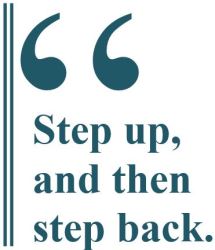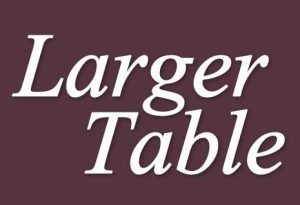by David Morstad
As a non-disabled person of faith advocating for people with disabilities, it used to be enough to stand on the verse in Proverbs 31, “Speak out for those who cannot speak for themselves.” It was clear, concise, and defined a call to act mercifully—though it drew some awkward lines of separation as well. You liked a medical model? Then disability was an illness and the “well people” like us were your voice. You preferred an educational model? Then people with disabilities were learners and we, the teachers, were your voice. More comfortable with a socioeconomic understanding? Then disabled people were the poor and marginalized, and we, the productive mainstream, laid claim to a voice that was never really ours to begin with.
But that landscape has been changing dramatically and the notion that some people will always need my non-disabled voice to speak for them is eroding. Credit the growth of our understanding, technology and other factors if you wish, but the real tribute belongs to the Disability Rights movement and the people who have claimed their own voice.
I am a white, non-disabled, middle-class, college educated, heterosexual male living in the United States. A Venn diagram of those characteristics would position me among the most privileged people in the country. While the ever-declining percentage of people in that category with me is at its lowest point in history, it is still where the power and influence is strongest. When it comes to matters of discrimination, poverty, isolation, limited access to healthcare, inadequate education, lack of transportation, and a host of other serious issues faced by people with disabilities, can I honestly claim that I have the same risk and firsthand knowledge? For the most part, I have yet to even experience those things, let alone develop any real expertise. My lack of credibility ought to be self-evident. In the midst of this change, have the words from Proverbs been rendered irrelevant? I don’t think so. In fact, there may be a chance to find a new and deeper meaning in the verse.
Lessons we have learned
I like to think there are some recent social parallels that offer direction toward a new way of thinking. Renée Graham, a columnist for the Boston Globe, wrote recently about issues of racism and white privilege. “Claiming you aren’t racist is meaningless,” he says, “What matters is recognizing racism, calling it by its name, and working to eradicate it.” In a contemporary #BlackLivesMatter consciousness, it has been asserted that one simply cannot grow up white in America without harboring at least some racial prejudice—however unintended that may be. If unintended racism is a byproduct of white privilege, is unintended ableism a byproduct of the privilege of ability? Probably. Do I unwittingly harbor subtle ableism as surely as I do racism? Probably.
 So, what is our role? Weh Yeoh, a physiotherapist supporting children with disabilities living in poverty, said this in a 2012 article, “In a recent discussion with a feminist friend of mine, we talked about how men such as myself should best be involved in advocating for women’s rights. ‘Step up, and then step back’ was the advice she gave me. I think non-disabled people can use the same attitude toward raising awareness of issues faced by people with disabilities.”
So, what is our role? Weh Yeoh, a physiotherapist supporting children with disabilities living in poverty, said this in a 2012 article, “In a recent discussion with a feminist friend of mine, we talked about how men such as myself should best be involved in advocating for women’s rights. ‘Step up, and then step back’ was the advice she gave me. I think non-disabled people can use the same attitude toward raising awareness of issues faced by people with disabilities.”
We do have a valuable role to play, we just need to be clear about what it is, and the one place where people without disabilities may speak confidently is from within our own non-disabled community. Proverbs 31:8 still lives there. We must speak truth to our own. There, we can acknowledge injustice and own the imbalance of power we have perpetuated. There, we can step up, saying what needs to be said to those who need to hear it, and then step back. There we can advocate for bringing real competence to the table in the form of lived experience, authenticity, and truth—the first-person voice of people with disabilities. There, we can speak. Then, step back.

There appears to be one dynamic missing from your opinion essay. That is the parent or sibling of the disabled individual. I do not include extended family such as grandparents, aunts/uncles, or cousins as they do not live within the immediate disabled space. I also find it interesting that you asked a feminist about advocacy and apply the answer from her experience instead of actually asking the disabled (a very diverse group with individual opinions about their disabilities and how they want them to be referred).
I am the parent of two sons with genetic syndrome disabilities. Both are adult men now; with differing extremes and effects associated with the syndrome. I advocate differently for each according to their individual needs and capabilities for understanding and expressing their needs. I also advocate some general issues from the perspective of having gone through the systems and seeing the generalized foundations that are needed so that individuals may adapt the foundation to their individual case need. There is a group (closed) on Facebook called the Disability Visibility Project that has become very helpful in recognizing the diverse opinions and preferences of the individuals. They have, for me, cut through the popular “political correctness” and encourages the “just ask” approach.
LikeLike
Thank you for your insight on this, Darla. I appreciate your thoughtfulness. In retrospect, I could have expanded that second paragraph to make it clear that my positions on disability matters are largely shaped by those with disabilities and the relationships I’ve had over the past few decades. My bad. The central issue of the post is really about non-disabled people and the many things that shape our thoughts and actions. I simply thought it would be interesting to bring in a couple of related –i.e., outsiders advocating for insiders — points of view. You’re very kind to take the time to read and respond.
LikeLike
“Speaking truth to our own,” Is a large enough responsibility, without trying to speak someone else’s truth. I always appreciate the challenges that you are writing presents, David.
LikeLike